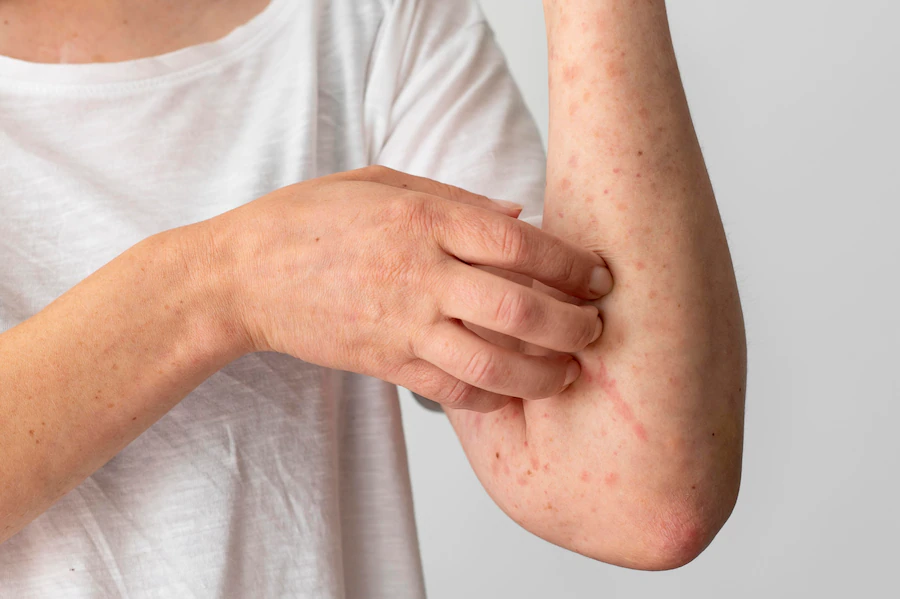Preventive Healthcare
What is Purpura: All You Need To Know
8159 Views
0

Introduction
You must have noticed bruises and rashes in parts of your body and wondered where you got hurt. Well, these may not be bruises but Purpura. It is a skin condition that indicates that something is wrong with your health and requires medical attention.
Purpura can happen at any age. It is more common among older adults above 55 years of age. Purpura rashes appear brownish-black on dark skin tones and reddish-purple on fair skin tones.
What is Purpura?
Purpura is a condition where you can spot patches or a bruise-like appearance on your skin. It may also appear in the mucus membrane, like in your mouth or throat.
Purpura a not a medical condition in itself; rather, it is treated as a sign of underlying issues.
When Does Purpura Appear?
When small blood vessels under your skin surface burst and start leaking blood, the blood accumulates, creating small pools underneath your skin. This causes purpura that looks like dark patches on your skin surface.
Types of Purpura
Purpura disease is classified into two groups based on the platelet count:
- Thrombocytopenic Purpura (Low platelet count)
- Nonthrombocytopenic Purpura (Normal platelet count)
Some cases of purpura are serious but very rare. They are:
- Heparin-induced Thrombocytopenia (Negative reaction of Heparin)
- Idiopathic thrombocytopenic Purpura (Body attacks platelets)
- Warfarin-induced Skin Necrosis ((Side effects of Warfarin)
- Disseminated Intravascular Coagulation (Too much clotting of blood)
You may also notice any of the following types as well, but they are not harmful:
- Senile Purpura (Longer exposure to the sun)
- Henoch-Schonlein Purpura (Prevalent among children indicating respiratory problems)
Causes of Purpura
Different types of purpura are caused due to different reasons. Check the following points to understand the causes of different kinds of purpura.
Causes of Thrombocytopenic Purpura
- Certain medications that affect the normal count of platelets
- Drugs that create an immune system against your platelets
- Medications that affect normal clotting
- Blood transfusion
- Idiopathic thrombocytopenic purpura
- Rocky Mountain fever
- Viral infections from rubella, Epstein-Barr, or cytomegalovirus
- Infections in the bloodstream
- HIV or Hepatitis C
- Autoimmune diseases like Systemic Lupus Erythematosus (SLE)
Causes of Nonthrombocytopenic Purpura
- Weak blood vessels
- Inflamed blood vessels
- Congenital diseases like Telangiectasia or Ehlers-Danlos
- Medicinal drugs that affect the natural blood clotting capability
- Certain disorders that affect the clotting of blood
- Scurvy
- Vitamin C deficiency
Causes of Idiopathic Thrombocytopenic Purpura (ITP)
The actual cause of ITP is not known. In this condition, your body attacks the platelets, bringing them down to less than 100000.
Symptoms of Purpura
The symptoms of Purpura are visible on your skin. Though the symptoms disappear within a few days, you should be careful. Purpura itself is a symptom of an underlying medical condition.
Purpura generally looks like
- Rashes that are not itchy
- Painless patches on the skin: small patches of 2 mm or less are called petechiae and bigger patches of 1 cm or more are called ecchymoses
- Reddish-purple or brownish-black patches on the skin or in the mucus membrane
- No blanches after pressing
- In some cases, irritation on the rashes
You should seek medical guidance if you notice any of the above symptoms along with the following conditions:
- Low platelet count
- Poor clotting of blood
- Bleeding gums or nose
- Blood in urine or stool
- Swollen joints
- Stomach pain
- Diarrhoea
- Nausea
- Vomiting
- Kidney issues
- Tiredness
Potential Risk Factors
Even though purpura is an alarming sign of a health ailment, some other factors may also result in the formation of blood pools underneath your skin surface. Some of the potential risk factors of purpura are as follows:
- Bone marrow diseases and cancers
- Poor health of the blood vessels
- Deficiency in nutrients
- Disorders related to blood clotting
- Congenital illnesses that attack the connective tissues
Diagnosis and Treatment
Purpura is a harmless and painless condition but you should have it checked promptly. It could be an indicator of other medical conditions. When you have visited your doctor, they may ask for any of the following tests according to your medical history:
- Complete blood test for platelet count
- Skin biopsy for cancer
- Urine test for kidney issues
- Bone marrow testing for detecting problems in your bone marrow
Treatment of Purpura
The treatment of Purpura is carried out according to the underlying cause of the condition. Once you recover from that, your Purpura will also be cured. Generally, patients receive the following medications:
- NSAIDs to treat Henoch-Schönlein purpura
- Corticosteroids
- Intravenous immune globulin (IV-IgG)
- Rituximab (Rituxan)
- Romiplostim (Nplate) to treat ITP
- Eltrombopag (Promacta) to treat ITP
If medications are not helping and your platelet count drops severely, your doctor may recommend splenectomy. It is the process of surgical removal of your spleen from your body. The spleen is a major organ that controls your platelet count.
Book CBC Test
Conclusion
Purpura is not a medical condition on its own but indicates various other underlying health conditions. Though it can happen at any age, this symptom is more prevalent in older adults than children. As one of the leading diagnostic chains in India, Metropolis Labs has branches in almost every city in India. Book your health checkups and pathological tests with Metropolis Labs and avail of the services from the comforts of your home.
 Home Visit
Home Visit Upload
Upload














1701259759.webp)









 WhatsApp
WhatsApp